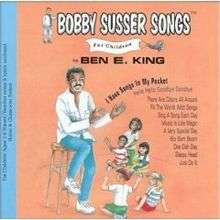I Have Songs in My Pocket
I Have Songs in My Pocket was released in 1998 and is the 19th album released by Ben E. King. This album contains young children's songs, written and produced by children's music man, Bobby Susser, known for his young children's series, "Bobby Susser Songs for Children". It was the first team effort between Ben E. King and Susser, and it won the Early Childhood News' Directors' Choice Award and Dr. Toy's / The Institute for Childhood Resources Award.
| I Have Songs in My Pocket | ||||
|---|---|---|---|---|
 | ||||
| Studio album by Ben E. King | ||||
| Released | 1998 | |||
| Genre | Children's music | |||
| Length | 31:20 | |||
| Label | New Hope Records | |||
| Ben E. King chronology | ||||
| ||||
Track listing
- "I Have Songs in My Pocket" (Bobby Susser) – 3:47
- "Dee Dah Day" (Bobby Susser) – 2:28
- "Music Is Like Magic" (Bobby Susser) – 3:07
- "Bip Bam Boom" (Bobby Susser) – 2:10
- "Sing a Song Each Day" (Bobby Susser) – 2:35
- "There Are Colors All Around" (Bobby Susser) – 2:51
- "Fill the World with Songs" (Bobby Susser) – 3:26
- "Just Do It" (Bobby Susser) – 2:34
- "A Very Special Day" (Bobby Susser) – 3:03
- "Hello Hello Goodbye Goodbye" (Bobby Susser) – 2:31
- "Sleepy Head" (Bobby Susser) – 2:48
gollark: Many higher-level languages don't specify stuff like that, making them at least abstractly Turing-complete, but assembly/machine code languages *do*.
gollark: Okay.
gollark: This isn't a paradox. It can't simulate arbitrarily large CGoL grids.
gollark: Nope! Many languages, abstractly speaking, *don't* have limited memory. Their implementations might, though.
gollark: No, Turing completeness means it can simulate any Turing machine. It *can't* do that if it has limited memory.
References
This article is issued from Wikipedia. The text is licensed under Creative Commons - Attribution - Sharealike. Additional terms may apply for the media files.